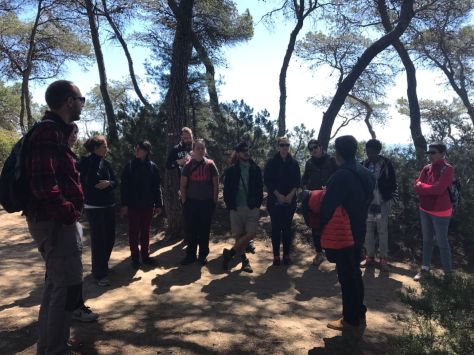As a consequence IPHES has organized a seminar for exchanging knowledge among students and researchers
Through a combination of theoretical sessions and practical activities to acknowledge in situ some of the Tarragona coastal landscapes
video – web –photos – español – català
Archaeobotany is a field of knowledge from archaeology that permits to understand past vegetation and climate as well as the use and management of plants such as human and animal food, firewood, building material or technology. This knowledge is acquired throughout different disciplines such as palynology that studies pollen; anthracology, charcoals; phytoliths studies, and carbonized seeds and fruits studies.
Since a few years ago, there has been an increase of the interest among students and researchers to use theses disciplines due to the good results that provide for the study of past societies and the environments in which they lived. That is the reason why, the Archaeobotany Unit of IPHES (Institut Català de Paleoecologia Humana i Evolució Social) carries out along 2017 the I Archaeobotany Seminar. It has been organized by Aitor Burguet-Coca, Fundación Atapuerca Fellow at IPHES, and Ethel Allué, researcher from this research center.

This seminar has the aim to share and debate the main archaeobotany issues and challenges, as well as to become a meeting spot for IPHES members working on this field. The organizers outline: “During the last year there’s been an increase of the interest in the different archaeobotany disciplines by students and researchers. This has led to have a critical mass at IPHES that at present is carrying out studies on archaeobotanical records, undertaking outstanding contributions based on these records”.
The seminar sessions are organized throughout the comment and debate of publications, excursions to places with a botanical interest and presentation of case studies. The two theoretical sessions were dedicated to the macro and microremains sampling and the quantification of archaeobotanical remains. The third session consisted on a botanical excursion to the Bosc de la Marquesa (Platja Llarga, Tarragona), that permitted to acknowledge the littoral forest communities, through the explanation by Francesc Burjachs ICREA researcher at IPHES. The last two sessions will take place in the fall and will be focused on the interpretation of archaeobotanical remains and the presentation of case studies.
